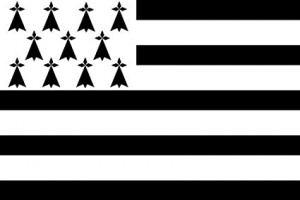Language/Breton/Vocabulary/Numbers
Demat, Breton Learners! 😃
➡ In today's lesson you will learn how to count in the Breton language spoken in Brittany (France).
Happy learning!
The Cardinal Numbers in Breton[edit | edit source]
Rules[edit | edit source]
0-9[edit | edit source]
Digits from zero to nine are rendered by specific nouns: mann [0], unan [1], daou / div (masculine/feminine) [2], tri / teir (masculine/feminine) [3], pevar / peder (masculine/feminine) [4], pemp [5], c'hwec'h [6], seizh [7], eizh [8] and nav [9].
Tens[edit | edit source]
The tens follow a vigesimal system (based on the number twenty): dek [10], ugent [20], tregont [30], daou-ugent (2*20) [40], hanter-kant (half-hundred) [ 50], tri-ugent (3*20) [60], dek ha tri-ugent (10+3*20) [70], pevar-ugent (4*20) [80] and dek ha pevar-ugent (10 +4*20) [90].
11-19[edit | edit source]
Compound numbers from eleven to nineteen are formed starting with the unit, followed by the root of the word for ten (dek): unnek [11], daouzek [12], trizek [13], pevarzek [14], pemzek [15], c'hwezek [16], seitek [17], triwec'h (literally, three sixes) [18] and naontek [19].
21-29[edit | edit source]
Compound numbers from twenty-one to twenty-nine are formed starting with the unit, followed by the particle warn (above), then the word for twenty (e.g.: unan warn ugent [21], c 'hwec'h warn ugent [26]). Compound numbers from thirty-one to ninety-nine are formed starting with the unit (or the number 11 to 19), followed by the particle ha (and), and the ten (exp. : tri ha tregont [33], seizh ha hanter-kant [57], pevarzek ha tri-ugent [74]).
Hundreds[edit | edit source]
Hundreds are formed by placing the multiplier digit in front of the word for hundred (kant or c'hant), with the exception of one hundred itself: kant [100], daou c'hant [200], tri c'hant [ 300], pevar c'hant [400], pemp kant [500], c'hwec'h kant [600], seizh kant [700], eizh kant [800] and nav c'hant [900].
Thousands[edit | edit source]
Thousands are formed by placing the multiplier figure in front of the word for thousand (mil or vil), with the exception of thousand itself: mil [1,000], daou vil [2,000], tri mil [3,000], pevar mil [4000], pemp mil [5000], c'hwec'h mil [6000], seizh mil [7000], eizh mil [8000] and nav mil [9000].
A million[edit | edit source]
A million is called ur million, and a billion, ur billion.
Table of Numbers from 0 to 1 million[edit | edit source]
| Number | Brezhoneg |
|---|---|
| 0 | mann |
| 1 | unan |
| 2 |
|
| 3 |
|
| 4 |
|
| 5 | pemp |
| 6 | c'hwec'h |
| 7 | seizh |
| 8 | eizh |
| 9 | nav |
| 10 | dek |
| 11 | unnek |
| 12 | daouzek |
| 13 | trizek |
| 14 | pevarzek |
| 15 | pemzek |
| 16 | c'hwezek |
| 17 | seitek |
| 18 | triwec'h |
| 19 | naontek |
| 20 | ugent |
| 30 | tregont |
| 40 | daou-ugent |
| 50 | hanter-kant |
| 60 | tri-ugent |
| 70 | dek ha tri-ugent |
| 80 | pevar-ugent |
| 90 | dek ha pevar-ugent |
| 100 | kant |
| 1,000 | mil |
| 1,000,000 | milion |
Sources[edit | edit source]
The Ordinal Numbers in Breton[edit | edit source]
| Brezhoneg | English | |
|---|---|---|
| 1o | kentañ, unanvet | first |
| 2o | eil, eilvet, daouvet, divvet | second |
| 3o | trede, trivet, teirvet | third |
The Fractions in Breton[edit | edit source]
| Brezhoneg | English | |
|---|---|---|
| 1/2 | hanter | half |
| 1/3 | trederenn | third |
| 1/4 | kard | quarter |
| % | an dregantad | percent |
| ar jederez | calculator |
Mathematics Vocabulary in Breton[edit | edit source]
| Breton | English |
| ar sammadur | addition |
| al lamadur | the subtraction |
| al liesadur | the multiplication |
| ar rannadur | the division |
| bras | big |
| brasoc'h eget/evit | bigger |
| bihan | small |
| bihanoc'h eget/evit | smaller |
| par da | equal |
| anpar da | different |
Videos: Learn the Numbers in Breton Language[edit | edit source]
Cours de breton débutant : Les chiffres[edit | edit source]
Piv a ra unan ? (Compter en breton avec Elsa Corre)[edit | edit source]
Chiffres et Sexe en breton - Brezhoneg Bemdez[edit | edit source]
Other Lessons[edit | edit source]
- Vegetables
- Fruits
- Weather and Climate
- Months of the year
- Location
- Geography
- Body
- Food
- Directions
- Time

